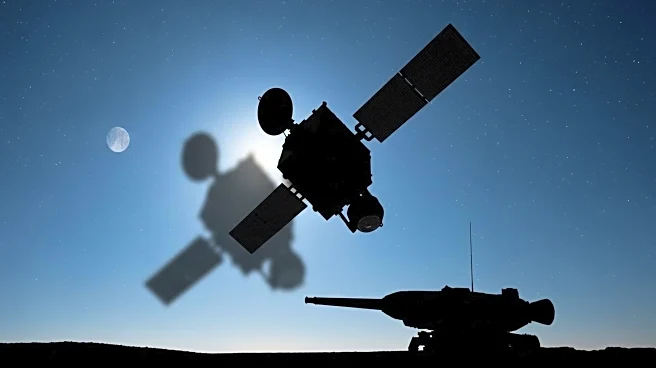What is the story about?
What's Happening?
German Defense Minister Boris Pistorius has raised concerns about Russian satellites shadowing Intelsat satellites used by German forces. Speaking at a space conference in Berlin, Pistorius highlighted the rapid expansion of Russian and Chinese capabilities for warfare in space, which includes disrupting, blinding, and destroying satellites. The minister emphasized the need for Germany to develop offensive capabilities in space as a deterrent against these threats. This marks a significant shift in Germany's defense policy, which has traditionally avoided anti-satellite weapons. The announcement comes amid growing tensions in space, with Russia's Luch Olymp satellites reportedly tracking German military assets.
Why It's Important?
The warning from Germany's defense minister underscores the increasing importance of space as a domain for military operations. As satellite networks become critical to modern societies, the ability to disrupt or destroy them poses a significant threat to national security. Germany's decision to consider offensive capabilities in space reflects a broader trend among European countries to enhance their defense infrastructure in response to Russian aggression. This strategic shift could lead to increased collaboration with NATO allies and influence other nations to prioritize space security in their defense strategies. The development of offensive capabilities also raises ethical and legal questions about the militarization of space.
What's Next?
Germany's focus on space security is likely to prompt discussions among NATO allies about the future of space warfare and the need for coordinated defense strategies. The development of offensive capabilities may lead to diplomatic negotiations with Russia and China to prevent escalation in space. Additionally, Germany's efforts to enhance its space domain awareness could drive technological advancements in satellite systems and cybersecurity. As Germany assumes more responsibility in space defense, it may seek to establish a dedicated military satellite operations center to manage its space architecture more effectively.
Beyond the Headlines
The decision to invest in offensive space capabilities raises ethical and legal concerns about the militarization of space. While deterrence is a key objective, the development of anti-satellite weapons could lead to an arms race in space, with significant implications for global security. Furthermore, the reliance on satellite networks for critical infrastructure highlights the vulnerability of modern societies to space-based threats. As countries invest in space security, there is a growing need for international agreements to regulate military activities in space and ensure the peaceful use of outer space.















